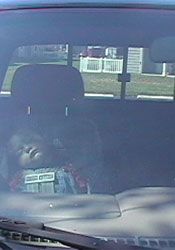Child Alone in a Parked Car: Is This Child Abuse?
A sleeping 12-month-old child was spotted alone in a parked car by a passerby. The passerby observed the situation for a period of time, only to see no one returned for the child. The passerby then called 911 for help after an undetermined length of time.

A sleeping 12-month-old child was spotted alone in a parked car by a passerby. The passerby observed the situation for a period of time, only to see that no one returned for the child. The passerby then called 911 for help after an undetermined length of time.
The police and emergency service workers arrived at the scene within 3 to 5 minutes of the 911 call. They were able to open the car and retrieve the child without incident. The temperature that day was 85 oF. The car was parked in the shade with one window open about one inch. The police report stated that the car was “very hot,” but no temperature was recorded in the report.
Approximately 30 minutes after the 911 call was placed, the child's 19-year-old mother returned and saw that her child had been removed from the car by the police and that they were waiting to speak to her. She told the police that she had been taking a final examination for her class at the community college. She thought that she would only be gone for 30 to 40 minutes and that no harm would come to the napping child in this quiet residential neighborhood.
The child arrived in the emergency department 16 minutes after the 911 call. The child's temperature was 101 oF; the heart rate was 145 beats/min while resting. The child was described as easily consoled. No bruises or other physical injury were noted on physical examination.
Is this abuse, an accident-- or just poor parenting? Click here for discussion.
The child received 20 mL/kg of normal saline as a fluid bolus in the ED and was observed for about 6 1/2 hours. The child was released in satisfactory condition into the custody of child protective services until an investigation could take place. Ultimately, no criminal charges were brought against this mother but her child was placed with the paternal grandparents for 3 months while the mother completed a parenting class.
The child in this case was displaying classic signs of heat exhaustion and was placed at risk by poor/uninformed parenting. Nearly 500 children have died in hot cars since 1998 when this type of information tracking was started.1 Nearly 18% of these children are left intentionally by parents in the car for what they perceive to be a short time. Another 30% of the deaths involve children who enter a car of their own volition to play. The remaining deaths occur in children who are forgotten in the car.
Two articles provide a very informative review of this subject.2,3 The authors of those articles came to essentially the same conclusions in separate research/reviews:
o Leaving a window partially open has minimal influence on the final temperature reached in an enclosed car.
o Within 30 minutes after the car is closed, the temperature rises to 80% of the maximum degree. Ultimately, temperatures may exceed 140 oF.
o Even on relatively cool days in direct sun, the car temperature rises sufficiently to put a child at risk of heat injury.
With informed parenting, locked car doors, and car seat alarms, all of these deaths are preventable.
Teaching points:
1. Include heat safety along with other car seat safety during health maintenance exams.
2. Parents may need to consider car seat alarms to decrease the likelihood of such accidents.
References:
1. Szabo L: More kids die in hot cars, half because parents forget them. USA Today. June 30, 2010. http://www.usatoday.com/news/health/2010-06-30-hotcars30_st_N.htm
2. Krouse HF, Nadeau JM, Fudumoto RI, et al. Enviromental hyperthermic Infant and early childhood death. Am J Forensic Med and Path. 2001;22:374-382.
3. McLaren C, Null J, Quinn J. Heat stress from enclosed vehicles: moderate ambient temperatures cause significant temperature rise in enclosed vehicles. Pediatrics. 2005;116(1):e 109-112.